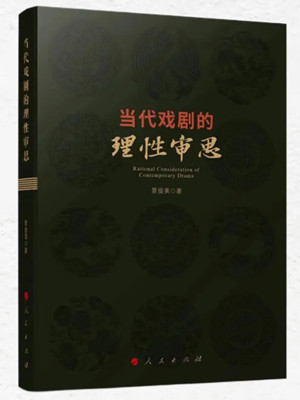


A reflection on contemporary drama

Rational Consideration of Contemporary Drama
Rational Consideration of Contemporary Drama, by Jing Junmei, deputy director and an associate research fellow of the Institute of Culture at the Beijing Academy of Social Sciences, offers a detailed examination of contemporary drama’s development and its influencing factors through the analysis of specific works, troupes, and phenomena.
The book addresses both longstanding and emerging theoretical issues in the field of drama. Among the “old issues,” Jing examines the compilation and adaptation of traditional operas, a subject of academic and practical exploration for over a century, witnessing various debates on criticism versus inheritance, preservation versus rescue, as well as reform versus innovation. Diverse theories, policies, and practices reflect the fluctuating fate of drama amid the tide of history. In addressing this issue, Jing begins with the evolution of opera policies, explaining the broader context for the inheritance and protection of traditional theater. The author then expounds on the successes and failures of traditional drama in modern presentation by analyzing specific works like “Li Huiniang,” concluding that “traditional opera is an impressionistic art, seeking to create distinct artistic images through formality, virtuality, norms, and exaggeration. Adapting traditional theater should follow this overarching principle.”
Among the “new issues,” the book addresses the development of drama within the contemporary Chinese cultural system. Considering drama’s cultural property, Jing suggests that art funds should lead without disrupting natural artistic principles that emerge within the market. A comprehensive approach is essential, balancing the demands of creators, performers, markets, and government regulators to foster a healthy, creative ecosystem for drama. The author also advocates for three principles of engaging with audiences: drama must not deceive, indulge, or underestimate them.
The book devotes considerable attention to the critique of specific works, with nearly every analysis advancing a theoretical insight. For instance, in discussing the play “Move-to-Turn into Human Form,” the author highlights the use of “light,” noting that “light accentuates the play’s intellectual and aesthetic characters, and, in particular, the incorporation of multimedia enables a flexible conversion between front and back stages.” The author encourages readers to pay attention to the “linguistic expression of stage lighting” and understand the language of light.
Similarly, regarding the Peking opera “Cao Cao and Yang Xiu,” the author notes the playwright’s deliberate departure from traditional moral perspectives to focus more on human nature, reflecting the play’s conscious literary aim and deep intellectual expression. Jing argues that such “literati drama” significantly differs from historical forms and presents many distinct characteristics, which could be termed “new literati drama.” These plays adapt to the evolving preferences and psychological needs of contemporary audiences, offering not only artistic enjoyment but also fresh historical insights and intellectual enlightenment.
Hu Yifeng is deputy director and an associate research fellow of the theoretical research office at China Federation of Literary and Art Critics.
Editor:Yang Lanlan
Copyright©2023 CSSN All Rights Reserved